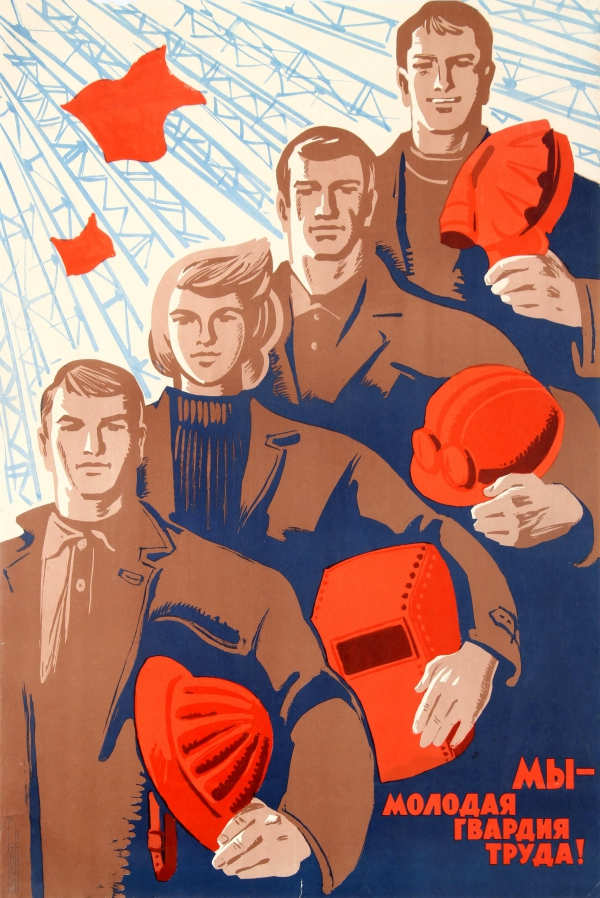Jucheguevara (talk | contribs) (created page) Tag: Visual edit |
(Image) Tag: Visual edit |
||
| (13 intermediate revisions by 7 users not shown) | |||
| Line 1: | Line 1: | ||
The '''proletariat''' is the [[social class]] of [[Wage | <blockquote>''"Working class" redirects here. For other working classes, see [[working class (disambiguation)]].''</blockquote> | ||
[[File:We are the young labour guard.png|thumb|334x334px|[[Union of Soviet Socialist Republics (1922–1991)|Soviet]] poster representing the proletariat]] | |||
The '''proletariat''' is the [[social class]] of [[Wage slavery|wage-earners]], those members of a society whose only possession of significant economic value is their [[labour power]] (their capacity to work) and owning no capital of their own nor the means of production. A member of this class is a '''proletarian'''. | |||
[[Marxism]] considers the proletariat to be oppressed by [[capitalism]], forced to accept meager wages in return for operating the [[means of production]], which belong to the class of business owners, the [[bourgeoisie]]. Marx claimed that this oppression gives the proletariat [[Workers of the world, unite!|common economic and political interests]] that transcend national boundaries, impelling them to unite and [[Dictatorship of the proletariat|take over power]] from the capitalist class, and eventually to create a [[Communism|communist]] society free from class distinctions. | [[Marxism]] considers the proletariat to be oppressed by [[capitalism]], forced to accept meager wages in return for operating the [[means of production]], which belong to the class of business owners, the [[bourgeoisie]]. Marx claimed that this oppression gives the proletariat [[Workers of the world, unite!|common economic and political interests]] that transcend national boundaries, impelling them to unite and [[Dictatorship of the proletariat|take over power]] from the capitalist class, and eventually to create a [[Communism|communist]] society free from class distinctions. | ||
==External | In ''[[The Principles of Communism]]'', [[Friedrich Engels]] explains that the proletariat is "that class in society which lives entirely from the sale of its [[labour]] and does not draw profit from any kind of [[capital]]." Their "sole existence depends on the demand for labor," and therefore the bourgeoisie subjects them to competition amongst their fellow workers. Proletarians differ from earlier workers like [[Feudalism|serfs]] because serfs have an assured existence and often own their own means of production.<ref name=":0">{{Citation|author=[[Friedrich Engels]]|year=1847|title=The Principles of Communism|mia=https://www.marxists.org/archive/marx/works/1847/11/prin-com.htm}}</ref> | ||
The interests of the proletarian are in conflict with those of the bourgeois. | |||
== History == | |||
Pre-industrial craftsmen temporarily relied on wage labor until obtaining enough capital to exploit others. With the rise of big industry, most craftsmen lost their property and became proletarians instead of guild masters. Likewise, the manufacturing workers of the 16th through 18th centuries owned their own means of production and became proletarians after moving to the cities and losing their [[Private property|property]]. | |||
The proletariat originated in the late 18th century during the [[Industrial Revolution]]. Capitalists bought the expensive machinery necessary for industry and displaced small craftsmen and artisans. Starting with the textile industry, they divided labor between their workers instead of having one worker produce an entire [[commodity]].<ref name=":0" /> | |||
== See also == | |||
* [[Lumpenproletariat]] | |||
* [[Peasantry]] | |||
* [[Precariat]] | |||
*[[Useless class]] | |||
==External links== | |||
''please use these external links to improve this page'' | ''please use these external links to improve this page'' | ||
*[[wikipedia:Proletariat|Wikipedia]] ([[Wikipedia|about]]) | *[[wikipedia:Proletariat|Wikipedia]] ([[Wikipedia|about]]) | ||
*[https://leftypedia.org/wiki/Proletariat Leftypedia] ([[Leftypedia|about]]) | *[https://leftypedia.org/wiki/Proletariat Leftypedia] ([[Leftypedia|about]]) | ||
*EcuRed ([https://www.ecured.cu/Proletariado Spanish], [https://translate.google.com/translate?hl=en&sl=es&tl=en&u=https%3A%2F%2Fwww.ecured.cu%2FProletariado English auto translated]) ([[EcuRed|about]]) | *EcuRed ([https://www.ecured.cu/Proletariado Spanish], [https://translate.google.com/translate?hl=en&sl=es&tl=en&u=https%3A%2F%2Fwww.ecured.cu%2FProletariado English auto translated]) ([[EcuRed|about]]) | ||
== References == | |||
[[fr:Prolétariat]] | |||
[[Category:Marxist terminology]] | |||
[[Category:Social class]] | |||
[[Category:Working class]] | |||
[[Category:Proletariat]] | |||
Latest revision as of 20:49, 28 October 2023
"Working class" redirects here. For other working classes, see working class (disambiguation).

The proletariat is the social class of wage-earners, those members of a society whose only possession of significant economic value is their labour power (their capacity to work) and owning no capital of their own nor the means of production. A member of this class is a proletarian.
Marxism considers the proletariat to be oppressed by capitalism, forced to accept meager wages in return for operating the means of production, which belong to the class of business owners, the bourgeoisie. Marx claimed that this oppression gives the proletariat common economic and political interests that transcend national boundaries, impelling them to unite and take over power from the capitalist class, and eventually to create a communist society free from class distinctions.
In The Principles of Communism, Friedrich Engels explains that the proletariat is "that class in society which lives entirely from the sale of its labour and does not draw profit from any kind of capital." Their "sole existence depends on the demand for labor," and therefore the bourgeoisie subjects them to competition amongst their fellow workers. Proletarians differ from earlier workers like serfs because serfs have an assured existence and often own their own means of production.[1]
The interests of the proletarian are in conflict with those of the bourgeois.
History
Pre-industrial craftsmen temporarily relied on wage labor until obtaining enough capital to exploit others. With the rise of big industry, most craftsmen lost their property and became proletarians instead of guild masters. Likewise, the manufacturing workers of the 16th through 18th centuries owned their own means of production and became proletarians after moving to the cities and losing their property.
The proletariat originated in the late 18th century during the Industrial Revolution. Capitalists bought the expensive machinery necessary for industry and displaced small craftsmen and artisans. Starting with the textile industry, they divided labor between their workers instead of having one worker produce an entire commodity.[1]
See also
External links
please use these external links to improve this page
- Wikipedia (about)
- Leftypedia (about)
- EcuRed (Spanish, English auto translated) (about)
References
- ↑ 1.0 1.1 Friedrich Engels (1847). The Principles of Communism. [MIA]